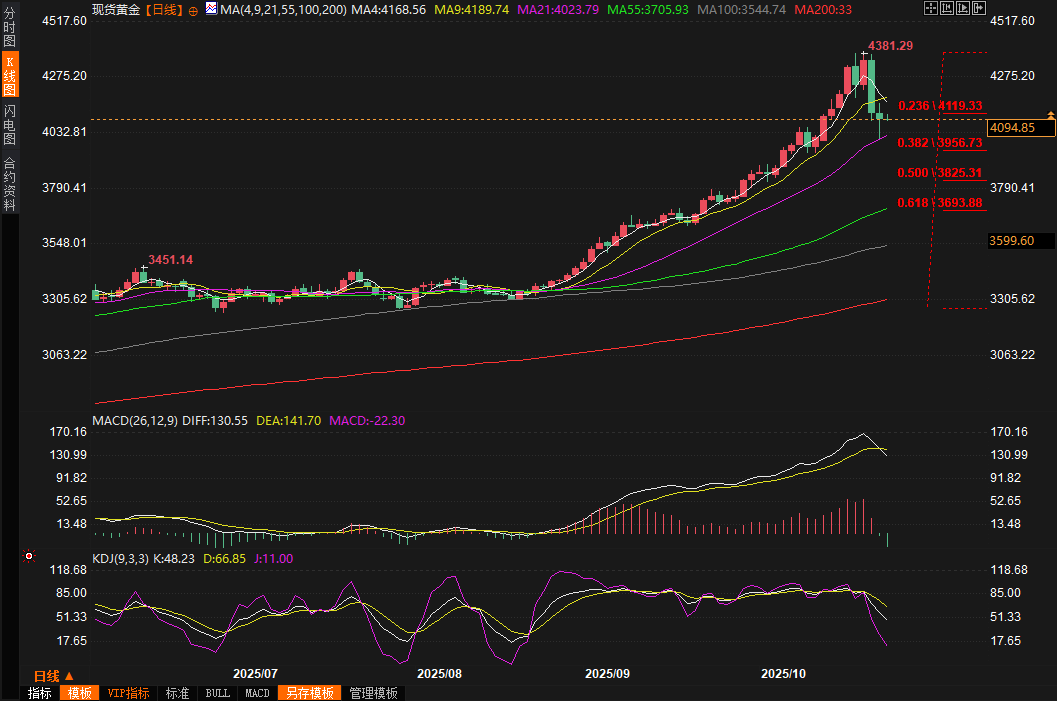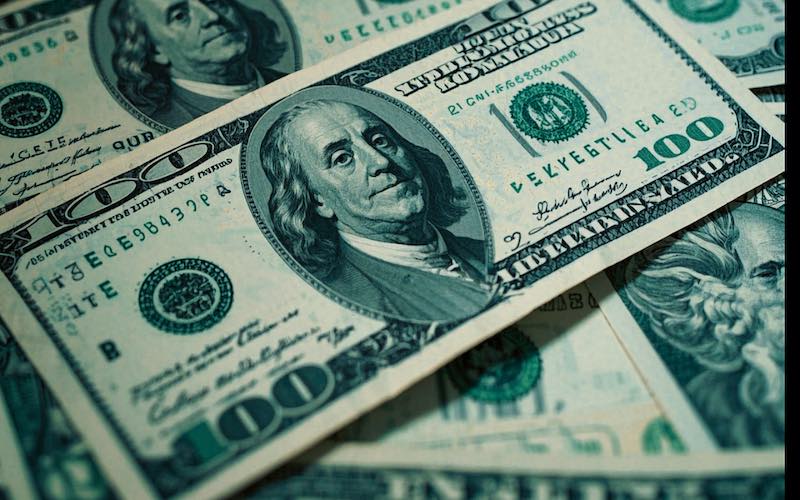Gold trading reminder: Gold prices narrowed their decline after holding the 4,000 mark. Is a new round of growth about to explode?
2025-10-23 07:17:28
On Wednesday (October 22nd), spot gold prices fell nearly 3% intraday, hitting a near two-week low of $4,004.46 per ounce, extending the previous day's rare single-day drop of 5.3%. However, multiple factors attracted bargain-hunting, helping gold prices hold the $4,000 mark and briefly rebound to around $4,160. During the New York session, the price again tested support near $4,000, but rebounded again on bargain-hunting, narrowing its losses to $4,098.29 per ounce by late trading, down 0.64%. This trend reflects market caution ahead of the release of key economic data. In early Asian trading on Thursday (October 23rd), spot gold prices fluctuated narrowly in a range, currently trading around $4,195 per ounce.
David Meger, director of metals trading at High Ridge Futures, pointed out that given the significant rise in gold prices in the past few weeks, it is not surprising that there was profit-taking before the release of the US Consumer Price Index (CPI) report. Technically, gold prices found support at the 21-day moving average of $4,005, indicating that a short-term bottom may have been formed.

Fed policy expectations: the game between interest rate cuts and inflation
The Federal Reserve's monetary policy direction remains a key factor influencing gold prices. Market expectations are that the Fed will cut interest rates by 25 basis points at next week's meeting, with another 25 basis point cut in December. According to data from the London Stock Exchange Group (LSEG), federal funds rate futures indicate a 97% probability of a 25 basis point cut. This expectation provides significant support for gold prices, as low interest rates typically benefit non-yielding assets like gold.
However, the September CPI report, to be released on Friday, will be a key focus for the market. The report is expected to show core inflation remaining at 3.1%. If the figure meets or falls short of expectations, it could further reinforce expectations of rate cuts and support a rebound in gold prices. Conversely, if inflation figures exceed expectations, it could spark concerns that the Fed will slow its pace of rate cuts, putting pressure on gold prices. Neil Sutherland, portfolio manager at Schroder Investments, noted that while inflation remains above target, labor market weakness is a key consideration for the Fed, potentially ensuring a continuation of the rate cut path.
Geopolitical Situation: Impact of the Russia-Ukraine Conflict and US-China Relations
Geopolitical uncertainty has been a key driver of gold prices. Recent developments in the Russia-Ukraine conflict have drawn significant market attention. Russia stated that the planned meeting between Putin and Trump has been temporarily shelved, while Ukraine expressed its willingness to support a ceasefire through diplomatic channels. While the prospect of peace has provided some optimism in the market, the ongoing Russian military attacks on Ukrainian energy infrastructure and NATO's tough stance toward Russia indicate that geopolitical risks are far from over. Furthermore, the latest round of EU sanctions against Russia and the US's planned sanctions against Rosneft have further exacerbated global market tensions. These factors are providing potential support for gold's safe-haven appeal.
Meanwhile, the Trump administration is considering restricting high-tech exports to the Asian giant in response to China's rare earth export controls. This move could escalate trade friction between China and the US, fueling market uncertainty and thus benefiting gold prices. Investors should also closely monitor next week's potential meeting between Trump and the Chinese president, as the outcome could have a profound impact on gold prices.
The US government shutdown: an amplifier of economic uncertainty
The US government shutdown has lasted 22 days, the second-longest on record, with no immediate resolution in sight. The Senate's 12th rejection of a temporary funding bill on Wednesday highlighted deep partisan divisions on core issues such as healthcare benefits. The shutdown has not only delayed the release of key economic data but also weighed on short-term economic growth and the labor market. Jim Barnes, head of fixed income at Bryn Mawr Trust, said the economic data vacuum caused by the shutdown has heightened market uncertainty, and investor concerns about a weakening economy have further fueled demand for safe-haven assets.
Although the shutdown has limited direct impact on gold prices, its weakening of market confidence and potential disruption to Federal Reserve policy have indirectly provided support for gold. While investors await CPI data, they are also assessing the long-term impact of the shutdown on economic recovery.
U.S. Treasury market and U.S. dollar trends: external pressure on gold prices
The recent performance of the U.S. Treasury market has also significantly impacted gold prices. The 10-year Treasury yield fell for the third consecutive day, approaching a 6.5-month low of 3.949%. The 30-year and 20-year Treasury yields also fell to 4.534% and 4.507%, respectively. The decline in yields is partly due to the ongoing impact of the U.S. government shutdown, which has dampened market sentiment and fueled safe-haven flows into U.S. Treasuries, indirectly boosting demand for gold. Furthermore, the 20-year Treasury auction saw strong demand, with the winning rate below expectations, demonstrating continued investor confidence in U.S. Treasuries.
The subsequent decline in the US dollar index also provided some respite for gold prices. On Wednesday, the US dollar index hit a one-week high of 99.13, but fell back to 98.87 in late trading, down 0.08%. A weaker dollar typically supports gold prices, as gold is priced in US dollars, and a depreciating dollar reduces the cost of gold for international investors.
Market Outlook
Overall, the gold market is currently facing a complex environment intertwined by multiple factors. In the short term, profit-taking and technical adjustments may continue to put pressure on gold prices. However, expectations of a Federal Reserve rate cut, geopolitical risks, and uncertainty arising from the US government shutdown have combined to provide support for gold prices. Technically, the 21-day moving average at $4,005 will serve as key support. If gold prices can hold this level, a new round of upward momentum may emerge in the short term.
In the medium to long term, global economic uncertainty, ongoing geopolitical tensions, and the trajectory of the US dollar and US Treasury yields will remain key factors influencing gold prices. Investors should closely monitor Friday's CPI data and the outcome of next week's Federal Reserve policy meeting, while also being vigilant to new developments in the Russia-Ukraine situation and Sino-US relations. These events could act as catalysts for gold prices, determining whether the decline continues or the market resumes its upward trend.

(Spot gold daily chart, source: Yihuitong)
At 07:13 Beijing time, spot gold was trading at $4094.83 per ounce.
- Risk Warning and Disclaimer
- The market involves risk, and trading may not be suitable for all investors. This article is for reference only and does not constitute personal investment advice, nor does it take into account certain users’ specific investment objectives, financial situation, or other needs. Any investment decisions made based on this information are at your own risk.





















